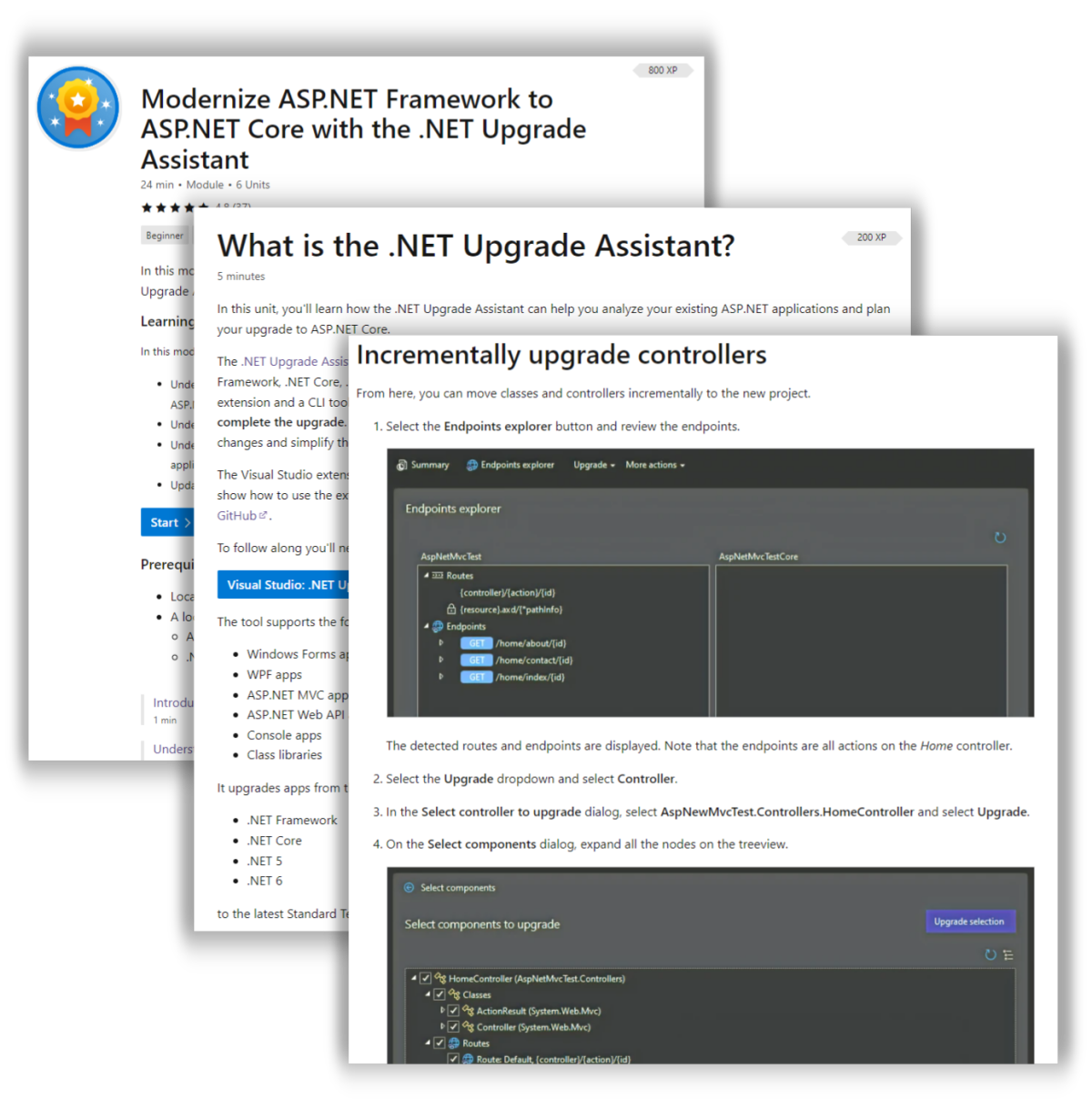

Learn how to modernize your .NET apps from the pros!
source link: https://devblogs.microsoft.com/dotnet/learn-how-to-modernize-your-dotnet-apps/
Go to the source link to view the article. You can view the picture content, updated content and better typesetting reading experience. If the link is broken, please click the button below to view the snapshot at that time.
Learn how to modernize your .NET apps from the pros!

Jon Galloway
There are a lot of great reasons to update your .NET apps to the latest and greatest versions of .NET. You can take advantage of new features, get better performance, and improve security. But how do you know where to start? What are the best practices for modernizing your apps? And how do you know if you’re doing it right?
Fortunately, we’ve got a lot of great resources based on real world experience working with customers to modernize their apps. In this post, we’ll share some top resources to help you modernize your .NET apps.
Why upgrade?
If you’ve got working code and limited hours, you might be wondering why you should upgrade your .NET apps. Here are some of the top reasons:
Take advantage of huge performance improvements
Performance has been a major focus in .NET 7. We’ve made a lot of improvements to the runtime, the JIT, the GC, and in all of the application workloads. We’ve written a lot of blog posts on .NET performance improvements because it’s a core focus for us, and a key value for you. By updating your applications, you get two big performance benefits: faster execution, and better efficiency. These offer substantial customer experience improvements for your customers, and significant cost benefits for application owners.
Use new features and paradigms in your applications
Each release of .NET includes a lot of new features – new APIs, support for new standards, language features, updated platform support, and more. Newer releases include support for modern application paradigms like microservices, serverless, and modern CI/CD.
Enable new development and deployment opportunities with cross-platform support
Moving from .NET Framework to modern .NET unlocks an entire new world of cross-platform support. You can develop and run your apps on Windows, Linux, and macOS, and you can deploy them to the cloud or on-premises.
If you’re on a previous version of .NET Core, upgrading to the current release gives you additional cross-platform support, including [enhanced support for Linux and containers] as well as first tier support for additional support for Apple M1 and ARM64.
Now is a great time to upgrade, thanks to the Upgrade Assistant!
Our team supports a lot of large customers who have significant upgrade challenges – large applications with decades of code, complex build and deployment pipelines, and a lot of dependencies on third party libraries. We’ve learned a lot from these customers, and we’ve built a tool based on what we’ve learned: the .NET Upgrade Assistant. Originally we shipped the .NET Upgrade Assistant as a CLI tool; based on your feedback, we now provide a unified upgrade experience for every project type inside of Visual Studio. We’ve updated our training material and created new video content to help you get started with the Visual Studio Upgrade Assistant extension.
Get a quick start with our two hour Let’s Learn .NET video
This two hour video is a great place to get started. Olia Gavrysh and Mike Rousos walk you through the basics of modernizing your .NET apps:
- Why upgrade?
- Supported workloads and paths
- The Visual Studio Upgrade Assistant extension
- Walkthrough upgrading an ASP.NET MVC 5 (.NET Framework) app to .NET 7
- Using the Upgrade Planner
- Desktop and Xamarin upgrades
- Top resources
Go hands on with our updated Learn Module
We’ve updated the Modernize ASP.NET Framework to ASP.NET Core with the .NET Upgrade Assistant module on Microsoft Learn to show the latest guidance on using the Visual Studio Upgrade Assistant extension. This module walks you through the process of upgrading the same ASP.NET MVC 5 application that we used in the Let’s Learn .NET video.
Deep dive video series on ASP.NET app modernization
Mike Rousos shares his experience working with customers to modernize their ASP.NET apps. In this 18 part video series, he walks you through the process of upgrading a more complex ASP.NET MVC 5 (.NET Framework) app to ASP.NET Core 7, using all the latest tools including the Visual Studio Upgrade Assistant extension, YARP based incremental migration, and the Upgrade Planner. This walkthrough shows some more advanced issues that you might encounter when upgrading your apps, such as sharing session state, static resources, and authentication over the course of an incremental migration that may span weeks or months.
Resources for Xamarin upgrades
It’s a great time to update & migrate your Xamarin.iOS and Xamarin.Android apps to the latest version of .NET so you can take advantage of the latest features of .NET 7 including C# 11 and the new project system. James Montemagno recently posted some top Tips & Tricks on Upgrading Xamarin.iOS & Xamarin.Android to .NET for iOS & Android. We’ve also posted some updated docs on how to upgrade from Xamarin to .NET.
Summary
We know that modernizing your .NET applications can be challenging, and we’ve worked hard to share our experience and best practices with you. We hope these resources help you modernize your .NET apps.
Jon Galloway Principal Program Manager, .NET Community Team
Follow
Recommend
About Joyk
Aggregate valuable and interesting links.
Joyk means Joy of geeK
